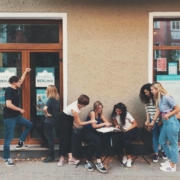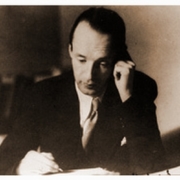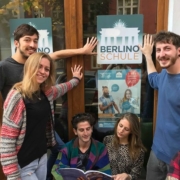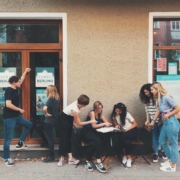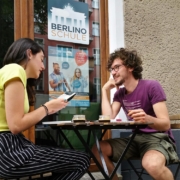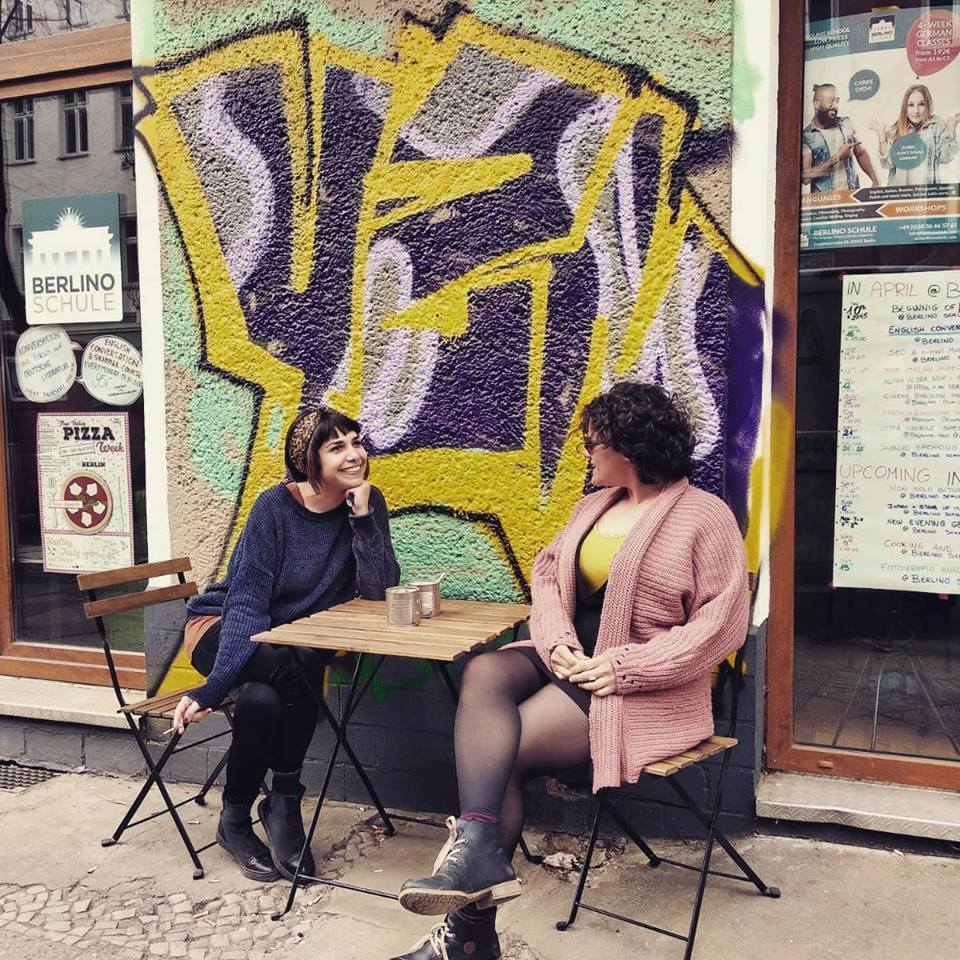Life is not too short to learn German. At least, if you attend Berlino Schule’s German courses
It is your first time in Berlin, or you have been living in Berlin for quite a lot of time, but you still have the feeling you cannot speak German fluently? Don’t worry. You are neither the first nor the last to experience this. This is why it is extremely important to rely on the right school. Berlino Schule provides you with qualified teachers, who have been teaching German for a lot of years. Don’t miss the opportunity to learn “this (not) impossible” language in an international environment!
German intensive courses starting from October
Intensive German courses are starting on 9th October at Berlino Schule and they will last 4 weeks, for a total amount of 48 hours: classes will take place 4 days a week (from Tuesday to Friday), 3 hours per day, from 8.45 to 11.15 or from 11.40 to 14.10.
A1.1 9 OCTOBER – 2 NOVEMBER (Tue-Fri 11.40-14.10)
A1.2 9 OCTOBER – 2 NOVEMBER (Tue-Fri 8.45 -11.15)
A2.1 9 OCTOBER – 2 NOVEMBER (Tue-Fri 11.40-14.10)
A2.2 9 OCTOBER – 2 NOVEMBER (Tue-Fri 8.45 -11.15)
B1.1 9 OCTOBER – 2 NOVEMBER (Tue-Fri 11.40-14.10)
B1.2 9 OCTOBER – 2 NOVEMBER (Tue-Fri 8.45 -11.15)
B2.2 9 OCTOBER – 2 NOVEMBER (Tue-Fri 8.45 -11.15)
Price: 192 euro + 20 euro registration fee
Look at our calendar to find out our intensive German courses
German intensive courses starting from November
A1.1 6 NOVEMBER – 30 NOVEMBER (Tue-Fri 8:45-11:15)
A1.2 6 NOVEMBER – 30 NOVEMBER (Tue-Fri 11:40-14:10)
A2.1 6 NOVEMBER – 30 NOVEMBER (Tue-Fri 8:45-11:15)
A2.2 6 NOVEMBER – 30 NOVEMBER (Tue-Fri 11:40-14:10)
B1.1 6 NOVEMBER – 30 NOVEMBER (Tue-Fri 8:45-11:15)
B2.1 6 NOVEMBER – 30 NOVEMBER (Tue-Fri 11:40-14:10)
German evening courses starting from November
Evening German courses are starting on 5th November at Berlino Schule and they will last 8 weeks, for a total amount of 48 hours: classes will take place 2 days a week (Monday and Wednesday or Tuesday and Thursday), 3 hours per day, from 19.15 to 21.40.
A1.1 6 NOVEMBER – 20 DECEMBER (Tue and Thu 19:15 – 21:40)
A1.2 5 NOVEMBER – 19 DECEMBER (Mon and Wed 19:15 – 21:40)
A2.2 6 NOVEMBER – 20 DECEMBER (Tue and Thu 19:15 – 21:40)
B1.2 5 NOVEMBER – 19 DECEMBER (Mon and Wed 19:15 – 21:40)
B2.2 6 NOVEMBER – 20 DECEMBER (Tue and Thu 19:15 – 21:40)
C1.1 5 NOVEMBER – 19 DECEMBER (Mon and Wed 19:15 – 21:40)
Price: 240 euro + 20 euro registration fee
Look at our calendar to find out our evening German courses
German intensive courses starting from December (3 weeks 2h40)
A1.1 3 DECEMBER – 21 DECEMBER (Mon-Fri 11.40 – 14.20)
A1.2 3 DECEMBER – 21 DECEMBER (Mon-Fri 8.45 -11.25)
A2.1 3 DECEMBER – 21 DECEMBER (Mon-Fri 11.40 -14.20)
A2.2 3 DECEMBER – 21 DECEMBER (Mon-Fri 8.45 -11.25)
B1.1 3 DECEMBER – 21 DECEMBER (Mon-Fri 11.40 -14.20)
B1.2 3 DECEMBER – 21 DECEMBER (Mon-Fri 8.45 -11.25)
B2.2 3 DECEMBER – 21 DECEMBER (Mon-Fri 11.40 -14.20)
Price: 192 euro + 20 euro registration fee
German intensive courses starting from January
A1.1 8 JANUARY – 1 FEBRUARY (Tue-Fri 8.45 -11.15)
A1.2 8 JANUARY – 1 FEBRUARY (Tue-Fri 11.40 -14.10)
A2.1 8 JANUARY – 1 FEBRUARY (Tue-Fri 8.45 -11.15)
A2.2 8 JANUARY – 1 FEBRUARY (Tue-Fri 11.40-14.10)
B1.1 8 JANUARY – 1 FEBRUARY (Tue-Fri 8.45 -11.15)
B1.2 8 JANUARY – 1 FEBRUARY (Tue-Fri 11.40 -14.10)
C1.1 8JANUARY – 1 FEBRUARY (Tue-Fri 8.45 -11.15)
Price: 192 euro + 20 euro registration fee
German evening courses starting from January
A1.1 7 JANUARY – 27 FEBRUARY (Mon and Wed 19.15 – 21.40)
A1.2 8 JANUARY – 28 FEBRUARY (Tue and Thu 19.15 – 21.40)
A2.1 7 JANUARY – 27 FEBRUARY (Mon and Wed 19.15 – 21.40)
B1.1 8 JANUARY – 28 FEBRUARY (Tue and Thu 19.15 – 21.40)
B2.1 7 JANUARY – 27 FEBRUARY (Mon and Wed 19.15 – 21.40)
C1.1 8 JANUARY – 28 FEBRUARY (Tue and Thu 19.15 – 21.40)
Price: 240 euro + 20 euro registration fee
German intensive courses starting from February
A1.1 5 FEBRUARY – 1 MARCH (Tue-Fri 11.40 -14.10)
A1.2 5 FEBRUARY – 1 MARCH (Tue-Fri 8.45 -11.15)
A2.1 5 FEBRUARY – 1 MARCH (Tue-Fri 11.40 -14.10)
A2.2 5 FEBRUARY – 1 MARCH (Tue-Fri 8.45 -11.15)
B1.1 5 FEBRUARY – 1 MARCH (Tue-Fri 11.40-14.10)
B2.1 5 FEBRUARY – 1 MARCH (Tue-Fri 11.40-14.10)
Price: 192 euro + 20 euro registration fee
German intensive courses starting from March
A1.1 5 MARCH – 29 MARCH (Tue-Fri 8.45 -11.15)
A1.2 5 MARCH – 29 MARCH (Tue-Fri 11.40-14.10)
A2.1 5 MARCH – 29 MARCH (Tue-Fri 8.45 -11.15)
A2.2 5 MARCH – 29 MARCH (Tue-Fri 11.40-14.10)
B1.1 5 MARCH – 29 MARCH (Tue-Fri 8.45 -11.15)
B1.2 5 MARCH – 29 MARCH (Tue-Fri 11.40-14.10)
Price: 192 euro + 20 euro registration fee
German evening courses starting from March
A1.1 5 MARCH – 25 APRIL (Tue and Thu 19.15 – 21.40)
A1.2 7 MARCH – 24 APRIL (Mon and Wed 19.15 – 21.40)
A2.1 5 MARCH – 25 APRIL (Tue and Thu 19.15 – 21.40)
A2.2 4 MARCH – 24 APRIL (Mon and Wed 19.15 – 21.40)
B1.2 5 MARCH – 25 APRIL (Tue and Thu 19.15 – 21.40)
B2.2 4 MARCH – 24 APRIL (Mon and Wed 19.15 – 21.40)
Price: 240 euro + 20 euro registration fee
German conversation course
You can write German, but you cannot speak it fluently. We have the right solution for you! The German conversation course starts on 1st October, and it takes place every Monday from 17 to 18.30, for a total of 9 classes. Each class is composed by 2 units (each unit: 45 minutes, according to Common European Framework of Reference for Languages).
Skype/private classes
We want learning to be accessible to everyone, even if you don’t live in Germany or don’t have the time to come to our school. Our individual and Skype classes are made up for beginners (A1.1) and advanced learners (C1). An attendance certificate will be given to you at the end of your eLearning classes. If you want to take individual classes, no previous knowledge is required. Our flexible schedule will meet your specific linguistic needs and working hours. The attendance will be define with the school.The price is 28 € per hour (45 minutes).
Our teachers
The courses are held by teachers with certified experience in the language teaching field. At the end of the course a certificate of attendance will be released on demand.
Info and registration
Send an email to info@berlinoschule.com and we will reply with all the information you need. Check also our website to know more about Berlino Schule.
Berlino Schule
Gryphiusstraße 23, 10245 Berlin
030 36465765
info@berlinoschule.com

